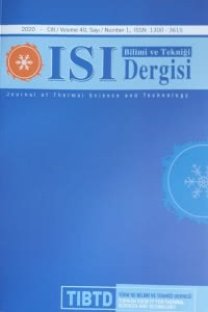ÇEVRE ŞARTLARININ GAZ TURBİNLİ KOJENERASYON ÇEVRİMLERİNİN PERFORMANSI ÜZERİNE ETKİLERİ
Bu çalışmada ekserji analizi metodu kullanılarak çevre şartlarının kojenerasyon çevrimlerinin performansıüzerine etkisi analiz edilmiştir. Bu kojenerasyon çevrimleri basit, hava ön ısıtmalı, hava-yakıt ön ısıtmalı ve girişhavası soğutmalı çevrimlerdir. Ayrıca bu çevrimler değişik hava yakıt kütle oranları için termodinamik açıdanincelenmiş ve performansları birbirleri ile karşılaştırılmıştır. Kompresor giriş havasının 25 0C’den 0 0C’ye soğutulmasıelektrik güç üretimini 10-15 % civarında artırmaktadır. Ancak ısı gücü giriş havasının soğutulmasından dolayı 10 %civarında düşmektedir. Kompresör giriş havasına su püskürtülerek yaz sezonunda elektrik gücü kolayca 2-7 %civarında artırılabilir. Kompresör giriş havasının basıncı 101.3 kPa’dan 70.18 kPa’ya düşürüldüğünde çevrimlerinekserji verimleri 11-13 % civarında düşmektedir. Ancak bu basınç düşüşü elektrik gücü üretiminde 25 % civarındadüşüşe yol açmaktadır. En yüksek ekserji verimi hava-yakıt ön ısıtmalı çevrimde elde edilmiştir. Dört çevrim arasındaen iyi ısı oranı ve ısı ekserjisi basit çevrimde elde edilmektedir. Bu çalışmada tüm çevre şartlarının bu çevrimlerüzerindeki etkisi aynı anda göz önüne alınarak analiz edilmiş ve birbiri ile karşılaştırılmıştır.
EFFECTS OF AMBIENT CONDITIONS ON PERFORMANCE OF GAS TURBINE COGENERATION CYCLES
In this paper, effects of the ambient conditions on performance of cogeneration cycles are analyzed by using exergy analysis method. These cogeneration cycles are the simple cycle, the air preheating cycle, the air-fuel preheating cycle and the inlet air cooling cycle. Also, these cycles are evaluated thermodynamically for different air and fuel mass ratio and the performance of these cycles are compared. The electrical power generation increases about 10-15 % by decreasing the inlet air temperature of the compressor from 25 0C to 0 0C. However, the thermal power decreases about 10 % with decreasing inlet air temperature. During the summer, the electric power can be easily increased 2-7 % by injecting water into the inlet air of the compressor. The exergetic efficiency of cycles is decreased 11-13 %, by decreasing the compressor inlet air pressure from 101.3 kPa to 70.18 kPa. But this change decreases the electric power generation about 25 %. The highest exergy efficiency is obtained for the air-fuel preheated cycle. The simple cycle is the best among the four cycles to obtain high heat rate and heat exergy. The effects of all ambient conditions on these cycles are considered simultaneously, analyzed and compared with each other in this study.
___
- Wang, F.J., Chiou, JS., 2002, Performance Improvement for a Simple Cycle Gas Turbine GENSET- a Retrofitting Example, Applied Thermal Engineering, 22, 1105-1115.
- Sue, D.C., Chuang, C.C., 2004, Engineering Design and Exergy Analyses for Combustion Gas Turbine Based Power Generation System, Energy, 29, 1183-1205.
- Santo, D.B.E., Gallo, W.L.R., 2000, Predicting Performance of a Gas Turbine Cogeneration System with Inlet Air Cooling, Ecos2000 Proceedings, Universiteit Twente, Nederland.
- Pilavachi, P.A., 2000, Power Generation with Gas Turbine Systems and Combined Heat and Power, Applied Thermal Engineering, 20, 1421-1429.
- Najjar, Y.S.H., 2001, Efficient Use of Energy by Utilizing Gas Turbine Combined Systems, Applied Thermal Engineering, 21, 407-438.
- Moran, J.M., and Tsatsaronis, G., 2000, The CRC Handbook of Thermal Engineering, CRC Press LLC, 15-109.
- Mohapatra, A.K. and Sanjay, 2014, Thermodynamic Assessment of Impact of Inlet Air Cooling Techniques on Gas Turbine and Combined Cycle Performance, Energy, 68, 191-203.
- Kim, T.S., Song, C.H., Ro, S.T., Kauh, S.K., 2000, Influence of ambient condition on thermodynamic performance of the humid air turbine cycle. Energy, 25, 313-324.
- Khaliq, A., Kaushik, S.C., 2004, Thermodynamic Performance Evaluation of Combustion Gas Turbine Cogeneration System With Reheat, Applied Thermal Engineering, 24, 1785-1795.
- Kehlhofet, R., Bachmann, R., Nielsen, H., Warner, J., 1999, Combined Cycle Gas Steam Turbine Power Plants, Penwell P.C.
- Karaali, Rabi, and Öztürk, İlhan Tekin, 2015, Thermoeconomic Analyses of Steam Injected Gas Turbine Cogeneration Cycles, ACTA Physica Polonica A 128, No:2B, B279-B281
- Karaali, R., and Ozturk, I.T., 2015, Thermoeconomic Optimization of Gas Turbine Cogeneration Plants, Energy, 80, 474-485.
- Karaali, R., 2010, Thermoeconomic Optimization of Cogeneration Power Plants, PhD Thesis, Kocaeli Univ., Turkey.
- Jaluria, Yogesh, 2008, Design and optimization of thermal systems, CRC Press.
- Horlock, J.H., 1997, Cogeneration-combined Heat and Power (CHP), CRİEGER Pub. Florida.
- Caresana, F., Pelagalli, L., Comodi, G., Renzi, M., 2014, Microturbogas Cogeneration Systems for Distributed Generation: Effects of Ambient Temperature on Global Performance and Components’ Behavior, Applied Energy, 124, 17-27.
- Boyce, M.P., 2002, Handbook for Cogeneration and Combined Cycle Power Plants, ASME Press New York.
- Bejan, A., Tsatsaronis, G., Moran, M., 1996, Thermal Design and Optimization. Wiley Pub.
- Ashraf, M.B., 2001, Effects of Evaporative Inlet and Aftercooling on The Recuperated Gas Turbine cycle, Applied Thermal Engineering, 21, 1875-1890.
- ASHRAE, 2000 Cogeneration systems and engine and turbine drives, ASHRAE Systems and Equipment Handbook (SI), Chapter 7, New York.
- Amel, A.A., and Cadavid, F.J., 2002 Influence of the Relative Humidity on The Air Cooling Thermal Load in Gas Turbine Power Plant, Applied Thermal Engineering, 22, 1529-1533.
- Al-Fahed, S.F., Alasfour, F.N., Abdulrahim, H.K., 2009, The Effect of Elevated Inlet Air Temperature and Relative Humidity on Cogeneration Systems, International Journal of Energy Research 33, 1384- 1394.
- ISSN: 1300-3615
- Yayın Aralığı: Yılda 2 Sayı
- Başlangıç: 1977
- Yayıncı: TÜRK ISI BİLİMİ VE TEKNİĞİ DERNEĞİ
Sayıdaki Diğer Makaleler
KANAT PROFİLLERİNİN DİKEY EKSENLİ BİR RÜZGÂR TÜRBİNİ PERFORMANSINA ETKİSİNİN SAYISAL İNCELENMESİ
Toygun DAGDEVİR, Nafiz KAHRAMAN, Orhan AKANSU
Mehmet Akif EZAN, Mustafa KALFA
İlhami HORUZ, Ahmet Bilge UYGUR, Cem ÖMÜR
ÇAMUR HALİNDEKİ SERAMİK HAMMADDELERİNİN KURUTMA KİNETİĞİNİN İNCELENMESİ
ÇEVRE ŞARTLARININ GAZ TURBİNLİ KOJENERASYON ÇEVRİMLERİNİN PERFORMANSI ÜZERİNE ETKİLERİ
İlhan Tekin ÖZTÜRK, Rabi KARAALİ
Levent Ali KAVURMACIOGLU, Cem Berk SENEL
GAZ TÜRBİNLİ KOJENERASYON TESİSLERİNİN PERFORMANS ANALİZLERİ
